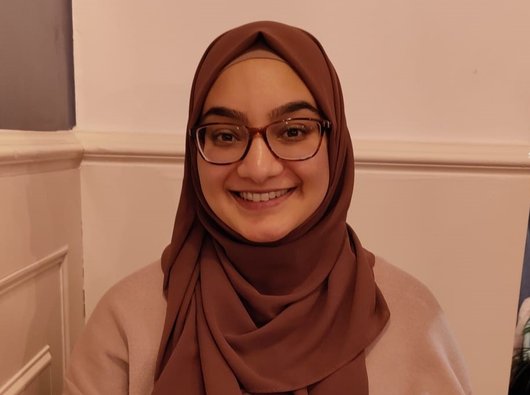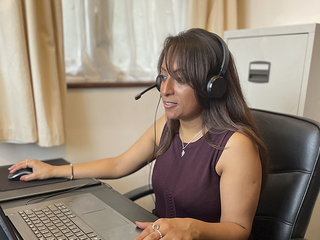Religious fasting and blood cancer
Many people fast for religious reasons, including during the Islamic holy month of Ramadan. Find out if it’s safe to fast when you have blood cancer, and what you can do if you are not able to fast.
Fasting in different religions
Fasting means not eating for a period of time, and sometimes not drinking or taking any medicines by mouth. There are many religions where people may take part in fasting, including:
- Christianity
- Hinduism
- Islam
- Judaism.
Each religion has different rules and guidance about what fasting involves, and how long to fast for.
On this page we focus on fasting during the Islamic holy month of Ramadan, as this is the longest period of fasting. But we hope the information is also useful for people of other faiths who might be thinking about fasting.
During Ramadan, Muslims who are able to fast avoid eating, drinking or taking any medicines by mouth during daylight hours. In 2025, Ramadan is expected to start on 28 February and end on 30 March.
Deciding whether to fast during Ramadan
Islamic law excuses individuals if they are sick or if fasting will cause them harm. Some Muslims with blood cancer do not fast during Ramadan, while others do. Your decision will be guided by what is important to you and your health.
If you are thinking about whether to fast, speak to your healthcare team about what’s safe for you. Sometimes it might feel difficult to talk to them about it. But telling your healthcare team what’s important to you, including your faith, will help them to give you the best possible advice and care.
If you choose to fast, your healthcare team can give you advice about the safest way to do so.
You could also ask a scholar or the imam at your mosque for guidance to help you make your decision. They will usually ask for the medical opinion to help them guide you better.
Your decision about whether to fast does not necessarily need to apply for the whole month of Ramadan. Some people try to fast for a few days before or during the start of Ramadan to see how their bodies cope, or do so with a break in between to give their body some rest.
"Looking back at that first Ramadan after my blood cancer diagnosis, it was definitely an emotional time. There was a lot of gratefulness, from me and my family, that I was able to make it to Ramadan."
Read Nabeela's story about how she managed fasting during Ramadan while recovering from blood cancer treatment.

Questions to ask your doctor or hospital team
- Is it safe to fast with my type of treatment or condition?
- Can you safely change the times I take my treatment, or the way I take it?
- Fasting means I won’t be drinking any fluids during daylight hours. Is this likely to affect my treatment or side effects?
- Are there any symptoms I should look out for that would mean I should break my fast?
- If it’s not safe for me to fast now, do you think I will be well enough to fast at another time?
- If I choose to fast, is there anything you recommend to help me fast safely?
Is it safe to fast?
Sometimes fasting while you are having blood cancer treatment could put your health at risk. Things that can affect whether it’s safe to fast include:
- the type of treatment you are having
- how long you have been having treatment
- if you are having side effects
- if you have any other medical conditions.
Your medical team are the best people to ask about whether it’s safe for you to fast, as they know your individual situation. It is important you ask some time before Ramadan about this because sometimes changes to medication take a while to do safely and may not be possible at short notice.
The British Islamic Medical Association has published some guidance about whether it’s safe to fast during Ramadan with different medical conditions. There has not been much research into the safety of fasting for people with blood cancer, so the guidance is mainly based on the expertise of the authors.
We’ve summarised the guidance below.
When fasting is likely to be unsafe
Fasting is very high risk for people who are:
- having any treatment that involves staying overnight in hospital (such as intensive chemotherapy, stem cell transplant or inpatient treatment for side effects or complications)
- newly diagnosed with myeloma and at risk of kidney damage
- in the first few weeks of treatment with venetoclax, as the dose is being increased
- having any treatment where tumour lysis syndrome is a risk (your doctor can tell you if this applies to you).
Fasting is high risk for people who:
- are taking medicines such as tacrolimus or ciclosporin (there’s a risk these can cause kidney damage if you don’t drink enough fluids)
- are having a course of radiotherapy
- have recently started the induction phase of chemotherapy
- are experiencing significant side effects
- are having treatment by mouth that must be taken twice a day (when fasts are more than 12 hours long) or with food
- have had a stem cell transplant in the past six months
- are having treatment for complications of a stem cell transplant, such as graft-versus host disease (GVHD).
This list does not cover every type of treatment or situation, and there may be other times when fasting is unsafe. Always check with your medical team if you’re unsure.
When fasting may be safe
The British Islamic Medical Association says fasting is moderate to low risk for the people in the list below, if they are not having significant side effects. This means fasting is likely to be safe, but always check with your hospital team or GP.
Fasting is moderate to low risk for people who are:
- having treatment by mouth that is taken once a day, if their medication is not affected by fasting. If taking oral chemotherapy, they should have been on it for at least three cycles with evidence that the treatment is working well.
- well-established on outpatient chemotherapy (where you go into hospital for treatment but don’t stay overnight), but fasting should only be considered on non-treatment days
- having maintenance immunotherapy such as rituximab or obinutuzumab
- on active monitoring (watch and wait)
- in remission and having regular follow-up appointments.
For all these people, fasting is only likely to be safe if you are not having any serious side effects.
After my treatment was over I asked my hospital team if it was safe for me to fast. They said that if I’d still been on active treatment they would have advised against it, but as I was in remission it was up to me, as long as I felt well enough.
- Nabeela, in remission from Hodgkin lymphoma since 2017.
If you are not able to fast
It might feel upsetting not being able to fast during Ramadan. Some people find it helps to remember that although fasting is an important part of Ramadan, it is not the only aspect of it and there are other ways to take part. These include spending time in spiritual reflection, reading the Quran and praying.
For those who cannot fast, Islamic teaching says there are other things you can do. A scholar or the Imam at your local mosque should be able to give more advice on this if you are unsure. These include:
- make up the fast another time in the year if you are well enough
- fasting during the winter months when the fasting hours are shortest
- giving food or donations (fidya) so someone living in poverty has food to eat.
Fasting safely during Ramadan
If you choose to fast, planning ahead can help you to fast safely. Consider some trial fasts ahead of Ramadan to help prepare your body. If you can, speak to your hospital team or GP in advance to get advice. See our suggested questions earlier on this page.
Here are some tips for a healthy and safe Ramadan:
- Stay hydrated – use the time between iftar and suhoor to drink plenty of fluids like water, squash and milk. You can also get hydration from water-rich fruits and vegetables like melon and cucumber, and foods like soups and stews.
- Don’t skip breakfast – sometimes you might not feel hungry waking up in the early hours, but a morning meal will give you energy to get through the day. The British Nutrition Foundation has some ideas for healthy breakfasts during Ramadan.
- Pay attention to your health – if you notice any new symptoms or side effects while fasting, or existing symptoms or side effects get worse, you should consider breaking your fast and get medical advice.
- Rest well – Ramadan has many social elements such as iftars and tarawih that can be demanding on the body over the month. You may need to consider your sleep patterns or change how you approach these aspects of Ramadan to conserve energy, especially if you are on treatment or if you are feeling run down.
- Consider not fasting every day – some people with blood cancer may feel well enough to fast some days, but not every day. It’s important to listen to your body and do what is safe for you. If you miss fast days during Ramadan, you can often make them up at another time.
This information has been endorsed by the British Islamic Medical Association. Thanks to Dr Salman Waqar and Dr Sajida Kazi of the British Islamic Medical Association and Dr Toby Eyre, Consultant Haematologist at Oxford University Hospitals, for their input and for checking the content.
Funding disclosure
The following pharmaceutical companies helped fund an earlier version of this information, but had no input into the content or direction of the project: Janssen-Cilag Ltd.
Read about how we work with the pharmaceutical industry.

Worried about anything or have questions?
If you need someone to talk to, please don't hesitate to contact our Support Service by phone or email.
